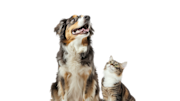
Pet insurance
5% pet insurance discount
Co-op members get a 5% discount on Co-op Pet Insurance in the first year as an introductory offer. Subject to minimum yearly total costs of £51.59 for dogs and £50.68 for cats.

We think of Seasonal Affective Disorder (SAD) as a human condition. However have you noticed that, when winter sets in, even the happiest dogs and fluffiest felines can become a little down in the mouth too?
Although there is no evidence to show that pets suffer from SAD, they are known to echo humans, becoming downbeat during the winter months. So if your pets appear to be dispirited around this time of year, they aren’t alone.
Matt Brash, star of TV series Zoo Vet at Large, explains: "I know from my own pets and ones I have seen as a vet, this time of year can be really dull. They have had a great time over Christmas with lots of walks and extra treats.
Now that we have all gone back to work, they can often get neglected.
Boredom can lead to bad habits, like chewing the furniture or messing in the house, so it is important to make sure that you keep them mentally and physically stimulated."
Fortunately, help is at hand. Matt Brash has compiled a short guide for dog and cat owners, exclusive to Co-op Insurance. Here are his seven top tips and insights to keeping your pets happy and well during the winter months.
If you and your pet have had one too many treats over the festive period, be sure to get them back on the straight and narrow with a nutritionally appropriate diet, in addition to regular walks or exercise.
As we’re all are prone to hibernating more in the winter months, due to the dark nights and poorer weather, we might walk our pets less and they may put on weight. This can lead to sad dogs, so it's important to make sure they still get their walks. If you are unable to walk them, cut down their food intake.
As the weather gets colder, we turn our central heating on more frequently to warm the house. This can wake up dormant fleas, so there may be an increase of flea activity in the house, leading to itching pets and people getting bitten. It's important to make sure their flea treatments are up to date.
If the weather gets really cold suddenly, then salt will be spread out on the roads and pavements to melt ice. This can be very sore on your pet's paws, leading to chemical burns. It is a good idea to bathe their feet when they come back in from a walk. The same applies with cats when they’ve been out.
Short-coated dog breeds like boxers, greyhounds and chihuahuas struggle to cope with the cold, so it's important to wrap them up with a coat when they venture outside for walks.
Stay away from frozen lakes and ponds, making sure you keep your dog on a lead if you are near frozen water. If they happen to run onto the ice, try to beckon them back from the edge of the water rather than going after them.
Both dogs and cats will spend more time indoors, which can lead to boredom. They can start developing bad habits like chewing things like shoes or the carpet. So, it’s a good idea to make sure they also have lots of things to do to keep them occupied.